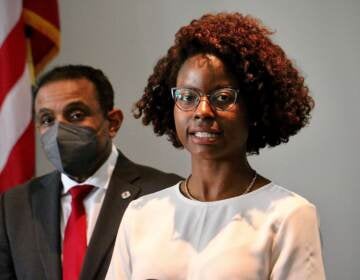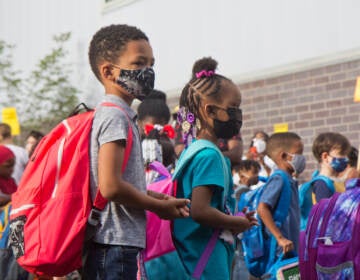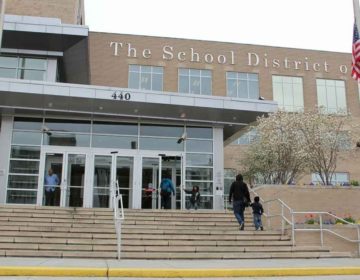Board of Education approves $11 million for Chromebooks, gives Hite emergency powers
Board members read (and sang) all the written testimony submitted and allowed real-time public input.
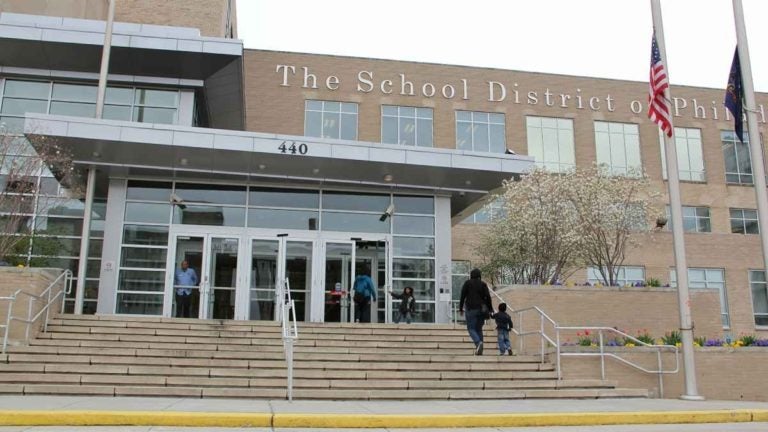
School District of Philadelphia. (Emma Lee/WHYY)
This story originally appeared on The Notebook.
In an extraordinary meeting for extraordinary times, the Philadelphia Board of Education on Thursday voted to spend $11 million to purchase 50,000 Chromebooks so that students can start structured online learning during the District’s shutdown of schools due to COVID-19.
The board also passed a resolution that gives Superintendent William Hite sweeping powers for the next month, allowing him to enter into contracts and take other actions without board approval so that he can quickly respond to needs during the crisis.
“This is unprecedented territory for us as a governing board,” said Board President Joyce Wilkerson.
Hite announced that the Chromebooks, from the Canadian company CDI Technologies, would be readied for distribution between March 30 and April 10. During that period, teachers will be trained in online learning. Families will be notified when and where they can pick them up between April 6 and 8, he said.
Starting on April 13, “teachers will begin using digital learning tools,” according to Hite’s presentation to the board.
The evening’s live-streamed and televised format gave viewers the strange sight of a few officials spread out in an almost-empty meeting room.
Along with Hite, three board members – Wilkerson, Christopher McGinley, and Julia Danzy – were carefully spaced apart at a U-shaped table that spanned the width of the room. The six other members participated by phone. Public testimony was taken in writing before the meeting and via Twitter and email during the session, but no members of the public were permitted to attend.
The quickly arranged format was less than ideal, board members acknowledged. And although the board made no specific promises about how next month’s meetings will run, member Lee Huang said he hoped they would be smoother.
“We hope to use what we learn in future meetings,” Huang said.
In statements, several board members expressed frustration and outrage at how the coronavirus crisis has more starkly exposed the digital divide – between students who have access to internet-connected devices at home and those who do not – and the inequities among school districts.
“The present is a wake-up call,” said member Mallory Fix-Lopez. “We should be outraged that our most vulnerable communities and children are at most risk as a result of the coronavirus crisis and school closures and that the achievement gap will likely widen during this time. We should be more outraged because, despite the new crisis, this is not a new story. It is a familiar story, the underfunding of our city and our public education system negatively impacting our children. We should all be outraged.”
Outgoing board member McGinley – as well as Hite and others – praised the staff and teachers who have stepped up on their own. “Thousands of teachers … are informally mentoring students and being responsive to the needs of students,” McGinley said. “I really am in awe of the contributions that people have made that they’re not required to make at this time.”
Harsh new fiscal reality coming
District Chief Financial Officer Uri Monson presented a lump sum budget and five-year-plan showing that the District would end both this fiscal year and the next with an operating surplus and that it is on track to “structural balance,” in which yearly revenues match yearly expenditures. The fund balance would be $153 million at the end of fiscal 2021 and $155 million in 2022.
However, Monson, who made his presentation by phone, cautioned that these numbers were several months old and that anything could happen.
The budget made the assumption that Gov. Wolf would secure the changes in the charter school reimbursement formula that he is seeking from the Republican-dominated legislature, which are estimated to save school districts across the state $425 million a year. If that change is not in the final budget, which must have legislative approval, Monson said, the District will start running in the red in fiscal 2022 and by 2025 it will have a shortfall of more than $400 million.
But that is only one iffy piece.
Monson said his state and city revenue assumptions were made before the economic downturn due to coronavirus. Skyrocketing unemployment will likely wreak havoc on expected tax revenue from sources such as the income and wage taxes, he said, not to mention the city liquor-by-the drink tax, all of which go to schools. Bars and restaurants are closed, drying up that source of funds for who knows how long.
“The pandemic threatens all of our revenue assumptions and those for our funders, the city and state,” Monson said. “A lot of pieces are up in the air right now. … I expect what I present in May will look very different from what’s before you right now.”
“This is like a nightmare,” Wilkerson said, but then tried to look on the bright side: “Liquor by the drink ought to rebound in a strong way when this is all over.”
The board later adopted the lump-sum budget; it must adopt a final budget by the end of May.
Hite also said that he would announce next week “the earliest date students can return safely to schools,” while noting that the situation is fluid and dependent on orders from Wolf and Mayor Kenney. He also said there would be more information next week on such issues as proms, graduations, sports events, and other rituals of school life that have now been put on hold.
“This is new for all of us, and there is still much work to do to finalize and implement this plan and act with urgency so students can get the technology they deserve and the learning opportunities they deserve,” Hite said. What is important, he said, is to maintain “access to learning while keeping everyone safe and healthy.”
The board also approved a series of contracts with outside vendors for everything from literacy support and preschool services to furniture and detergents. Hite also noted that current District contractors will not get paid for any work that has been put on hold. Wilkerson said that the Finance and Facilities Committee will take up the question of such contracts when it next meets, presumably next month; the committee’s March meeting was cancelled due to the viral outbreak.
Hite also summarized continuing work on asbestos abatement and lead safety that is ongoing in several schools under controlled conditions. Lead cleanup has already restarted at a few schools, including Pennypacker, McClure, Hopkinson, Sheppard, Olney, and Lowell Elementaries, Hite said. Asbestos remediation will soon begin again at McClure, Richmond, and Nebinger Elementary Schools, he said.
Testimony includes demands for better service
Originally, the board had planned only to take written testimony submitted 24 hours in advance, but after complaints from advocates, including Alliance for Philadelphia Public Schools (APPS), it allowed tweets and emails during the meeting.
The evening’s limited public testimony was dominated by demands for better academic services and more interactive meetings during the coronavirus shutdown, during which public gatherings of all kinds have been limited by order of the governor.
Although most public comments acknowledged the unprecedented nature of the crisis and the challenge it poses for District officials, much of the testimony featured frustration with the lack of clear and consistent communication about the District’s plans.
Testimony from Shakeda Gaines, head of the Philadelphia Home & School Council, typified the mood.
“In these times of uncertainty the unexpected is to be expected,” wrote Gaines. “But we expect our leaders to open, honest, and engaging. Thank you for trying, now go up 4 notches.”
Previously submitted public testimony like Gaines’ was read aloud by board members, as were a handful of questions and comments submitted via Twitter during the course of the meeting.
Much of that public testimony was unsparing. “I’m incredibly disappointed that the School Board is not having live public participation in their meetings. There’s so many concerns that communities have right now,” wrote community member Aiden Castellanos.
“As the school board, you all have a responsibility to the people who depend on schools in having interactive, engaged meetings,” Castellanos wrote.
Lisa Haver of APPS echoed the point, writing: “Many people at the meeting and watching the meeting have, over the past two weeks, attended online meetings through Zoom and similar technology. The Board could have had members of the public call in during the meeting in the same way that most of the Board members are calling in.”
“That is not a public meeting. That is a live TV show,” wrote Duong Ly, a member of the community group Viet Lead. “Most Board members will be present via phone. That same technology could be used to have members of the public testify.”
Testimony revealed a range of problems faced by families as they’ve tried to adjust to life without school. Several parents testified that they were unable to get the academic materials they needed at the District’s “grab-and-go” sites; others said that what was available was inadequate, particularly for students with special education or language needs.
“The Student’s Guide for Special Needs on the school district website is all in English. For me, it was very difficult and overwhelming,” wrote parent Manqing Lin.
“I feel that the school district is not doing enough, since I haven’t been able to get the learning package from the grab and go meal site,” wrote parent Jaraliz Montes. “They have been telling me to go online but I am not able to print it out.”
“These are trying and difficult times. … The sacrifices being made by all … are much appreciated,” wrote parent Cecelia Thompson, a longtime advocate for special education students. “However, the Learning Packets do not address the needs of students receiving special education services.”
Thompson, like others who testified, called on the District to step up its use of interactive technology to support parents and students.
“Have meetings with families, via Business Skype, Zoom, or phone,” Thompson wrote. “If students were using [learning programs] in schools, provide families with the appropriate information to access these programs at home.”
Andrea Moselle of the Our City Our Schools coalition wrote: “We appreciate some of the responses that the School District and the City have made in recent days … but more is needed. We need a commitment to robust, respectful, open and two-way communication between District and Board of Education Leadership and the stakeholders in the district.”
Board members sympathized with the frustration and said that they, too, want to see the District continue to improve.
“One of the participants asked the District to ‘kick it up a notch,’ and that’s what I’m asking,” said board member Maria McColgan.
But the board also noted that a degree of confusion is inevitable during the current crisis, and members called on the public for patience.
If staff members aren’t providing clear information now, said board member Julia Danzy, it’s not because “we’re so incompetent,” but “because so many things are changing. We like to make things as normal as possible in times we don’t understand. It can’t always be that way.”
Today’s troubles, Danzy said, will eventually make way for a better tomorrow. “In the end, I predict we will be even stronger, more united, and more appreciative of the value of our children going to school.”
McGinley sounded a similar note. He said he has been encouraged by what he’s heard from other educators who have dealt with natural disasters and other major disruptions.
“To a person, these educators said, things balanced out, and kids continued to make progress once they got back to school,” McGinley said, before thanking community members for “pitching in and doing everything they can do.”
Traffic on the #Phled hashtag was relatively light during the course of the meeting, with just a handful of readers submitting questions to the board’s #boardcomment hashtag. Traffic was also light on the #TEACHOURKIDS hashtag being promoted by the child advocacy group PCCY, whose leader, Donna Cooper, submitted her testimony in video form.
“The engine of the district must turn wholeheartedly toward instruction,” Cooper said, calling for technology and laptops to be distributed by next week and online instruction to begin by April 15. “Every teacher, classroom aide, special education contractor, high school guidance counselor and contracted [program] like Gear Up must be used to educate our children now.”
Tweets showed the meeting was closely followed by some familiar District watchdogs and advocates, including APPS, Parents United for Public Education, Philly School Counselors United, and the Caucus of Working Educators, who tweeted as the meeting closed: “I hope ya’ll realize how fragile chromebooks really are and how often students break them.”
I hope ya’ll realize how fragile chromebooks really are and how often students break them. #PhlEd
— Caucus of Working Educators (@CaucusofWE) March 26, 2020
Board President Wilkerson thanked District staff for scrambling to organize the meeting and monitor the Twitter feed and email. She promised to improve the use of technology, but stopped short of promising any particular level of interactivity. “Hopefully it will be a little smoother next time,” Wilkerson said.
This @PHLSchoolBoard mtg has been wild. Juggling notes, PPT, livestream, audio, & Twitter. My 4yo (who doesn’t get how I can be home but unavailable) is demanding my attention. I’ve had to upgrade him to 3 goodnight kisses & a 2nd cup of water to calm him. #1stWorldDadProblems
— Lee Huang (@leehuang) March 26, 2020
The unusual and at-times awkward format produced at least one unlikely highlight when board member Fix-Lopez, while reading submitted public testimony aloud, was called upon to sing.
Community member Ilene Poses had rewritten the classic “Follow the Drinking Gourd” with new lyrics calling for greater board transparency, and it fell to the board member to deliver the tune.
“Follow the Sunshine Act,” Fix Lopez sang gamely as board members struggled to stifle their laughter. “The public is awaiting to participate in meetings, so follow the Sunshine Act.”
“You’ve gone above and beyond,” Wilkerson said with a laugh when the song was finished.
“You owe me,” replied Fix-Lopez.
WHYY is your source for fact-based, in-depth journalism and information. As a nonprofit organization, we rely on financial support from readers like you. Please give today.



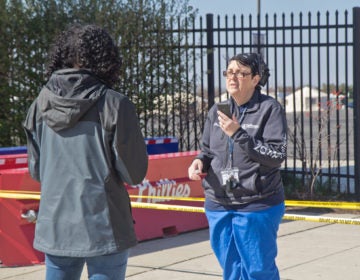
![CoronavirusPandemic_1024x512[1]](https://whyy.org/wp-content/uploads/2020/03/CoronavirusPandemic_1024x5121-300x150.jpg)
